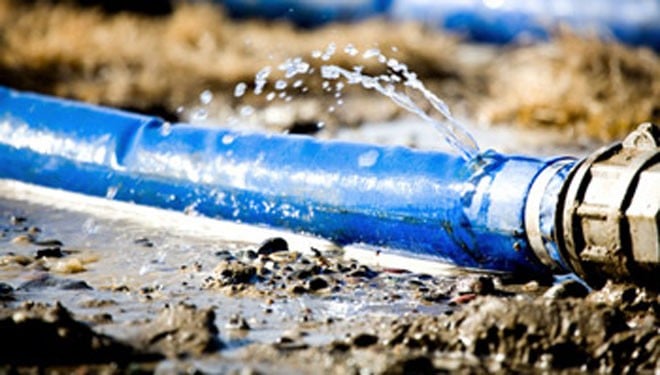
In the absence of adequate water conservation strategies and their implementation, precious water continues to be wasted

Water conservation aims at making policies and devising activities to use water as a sustainable resource to protect environment and to meet the demands of human beings. As far as Pakistan is concerned, it is considered as a water-scarce country because of mismanagement of the available water.
"It is estimated that Pakistan’s water availability in 2025 will be 104 million acre feet (MAF), while the requirement (for drinking water) would be 135 MAF; so there will be a shortfall of 31 MAF," says Sohail Ali Naqvi, Senior Officer, Water Stewardship Project, (WSP), WWF-Pakistan. "Pakistan’s current water availability is 1090 m3 per capita (UNDP) as compared to 1700 m3 in 1992," he adds.
Drastic steps have to be taken to not just raise awareness among the common people but also make and implement strategies to conserve water and limit wastage in the agriculture and industrial sectors, etc. The country’s per capita water availability has reduced upto 960 m3/capita, according to WWF-Pakistan.
Naqvi gives some eye-opening facts and figures, Pakistan stands on the 7th position among the top ten ‘Water Insecure’ countries, according to Water Security Risk Index. And irrigation and agriculture use upto 97 per cent of Pakistan’s allocated water."
"In Pakistan, 10 per cent of people do not have access to safe drinking water, according to estimates of the Human Development Report, 2010)." He says WWF-Pakistan has initiated different projects for water conservation in agriculture and industrial sector. "Recently, we are running an EU-funded project for pollution reduction and water conservation in the SMEs of Punjab by adopting some Best Water Management Practices (BWMPs)."
Experts suggest water conservation programmes should ideally be started at the local level, at either provincial or municipal level. Strategies usually applied for water conservation include: awareness campaigns, metered water rates (charging progressively higher prices as water use increases), restrictions on outdoor water use, such as watering the lawns and washing cars at home. Use of drip and sprinkling irrigation techniques in agriculture can save a lot of water.
Water conservationists urge the farmers to grow more water-efficient crops and dispense with wasteful irrigation techniques. Adoption of new technologies elsewhere in the world is making the difference, such as wasting less water when using a toilet and using shower heads that help reduce wasting water.
"Water Resources and Conservation Strategy of Pakistan," a report published by Pakistan Institute of Development Economics, 2007, points to steps that should be taken to save wastage of water at the macro level. "The construction of dams in Pakistan is imperative, as only two dams have been constructed after 1947, whereas, India and Turkey has constructed 24 and 65 dams, respectively during the same period."
The report also says that, "The sedimentation in (Pakistan’s) reservoirs increasing drastically not just scuttled resources for irrigation but also lower energy production which also effects industrial sector’s expansion and efficiency of agriculture."
"Every year, a lot of (flood) water flows down into the sea and causes huge and irreparable losses to human lives, property, and assets of public and private sectors. For overcoming such menaces, small and flood dams at different sites should be constructed," it says.
Pakistan ratified Articles 11 and 12 of the International Covenant on Economic, Social and Cultural Rights in 2008, which make it obligatory on the country to better manage its water resources in order to secure the right to water of its citizens.
"Keeping in view magnitude of the challenge ahead, we need to promote water conservation solutions in the country which are low cost and appropriate to local contexts," says Abdul Hafeez, Programme Manager, Policy and Advocacy, WaterAid, Pakistan.
"We now have to move beyond from existing solutions (for example rain water harvesting at household and local levels) to rather planning holistically by developing water security plans for the water scarce areas," he adds.
Hafeez says "the government needs to take further measures to protect and conserve surface and groundwater resources, especially which are being used for drinking water purpose. In this regard, government needs to encourage recycling and re-use of water, water schemes to reduce water losses and wastage, promotion of water saving techniques, and equipment and regulation of underground water."
But he believes that would not be an easy task unless "the general masses are educated through a mass awareness campaign for water safety, safe hygiene practices, and water conservation in the country."
"Our mandate is to make policies for water conservation, for instance, and facilitate the provinces to implement these policies under the 18th Amendment," says Irfan Tariq, Director, Federal Ministry of Climate Change.
"Water conservation is covered in our Climate Change Policy 2012, which has been approved by the cabinet and which aims at saving water in different sectors, such as irrigation. Building by-laws in Islamabad, for instance, make it obligatory on a constructor to make rainwater harvesting system in a house; that is storing rainwater for use for gardening or irrigation purposes."
The implementation of water conservation policies, according to Tariq, is overseen by a committee.